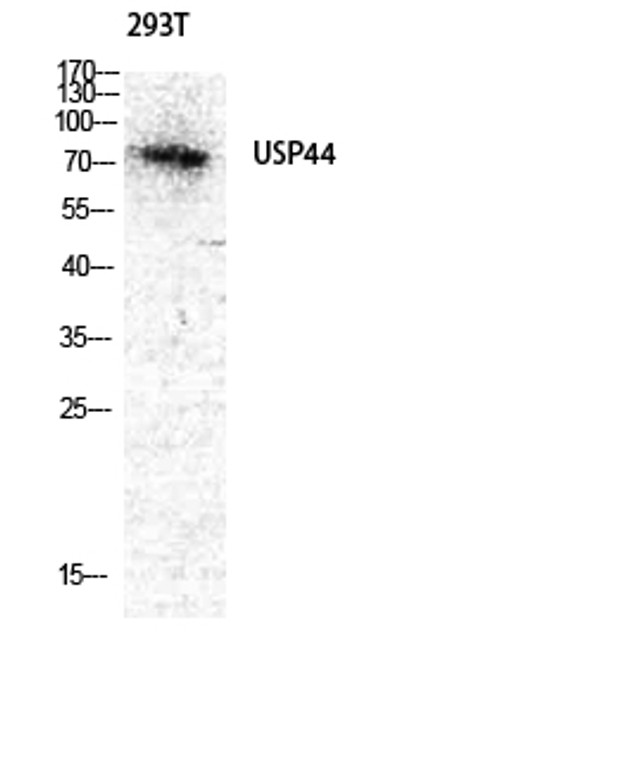| Host: |
Rabbit |
| Applications: |
WB/ELISA |
| Reactivity: |
Human/Rat/Mouse |
| Note: |
STRICTLY FOR FURTHER SCIENTIFIC RESEARCH USE ONLY (RUO). MUST NOT TO BE USED IN DIAGNOSTIC OR THERAPEUTIC APPLICATIONS. |
| Short Description: |
Rabbit polyclonal antibody anti-Ubiquitin carboxyl-terminal hydrolase 44 (211-260 aa) is suitable for use in Western Blot and ELISA research applications. |
| Clonality: |
Polyclonal |
| Conjugation: |
Unconjugated |
| Isotype: |
IgG |
| Formulation: |
Liquid in PBS containing 50% Glycerol, 0.5% BSA and 0.02% Sodium Azide. |
| Purification: |
The antibody was affinity-purified from rabbit antiserum by affinity-chromatography using epitope-specific immunogen. |
| Concentration: |
1 mg/mL |
| Dilution Range: |
WB 1:500-1:2000ELISA 1:40000 |
| Storage Instruction: |
Store at-20°C for up to 1 year from the date of receipt, and avoid repeat freeze-thaw cycles. |
| Gene Symbol: |
USP44 |
| Gene ID: |
84101 |
| Uniprot ID: |
UBP44_HUMAN |
| Immunogen Region: |
211-260 aa |
| Specificity: |
USP44 Polyclonal Antibody detects endogenous levels of USP44 protein. |
| Immunogen: |
The antiserum was produced against synthesized peptide derived from the human USP44 at the amino acid range 211-260 |
| Post Translational Modifications | Dephosphorylated by CTDP1. Ubiquitinated.undergoes both 'Lys-48'- and 'Lys-63'-linked polyubiquitination and is degraded by the proteasome. |
| Function | Deubiquitinase that plays a key regulatory role in the spindle assembly checkpoint or mitotic checkpoint by preventing premature anaphase onset. Acts by specifically mediating deubiquitination of CDC20, a negative regulator of the anaphase promoting complex/cyclosome (APC/C). Deubiquitination of CDC20 leads to stabilize the MAD2L1-CDC20-APC/C ternary complex (also named mitotic checkpoint complex), thereby preventing premature activation of the APC/C. Promotes association of MAD2L1 with CDC20 and reinforces the spindle assembly checkpoint. Promotes also the deubiquitination of histone H2A and H2B. Recruited to RNF8/RNF168-ubiquitinated chromatin surrounding double stranded breaks (DSBs), promotes hydrolysis of such ubiquitin conjugates, thus negatively regulating protein recruitment to damaged chromatin. Participates in nucleotide excision repair (NER) pathway by deubiquitinating DDB2 to prevent its premature degradation so it can remain on damaged chromatin. Promotes FOXP3 stabilization through 'Lys-48'-linked deubiquitination leading to increased stability and increased regulatory T-cell lineage stability. Plays also a positive role in innate immune response to DNA viruses by deubiquitinating STING1, selectively removing its 'Lys-48'-linked polyubiquitin chains and stabilizing it. |
| Protein Name | Ubiquitin Carboxyl-Terminal Hydrolase 44Deubiquitinating Enzyme 44Ubiquitin Thioesterase 44Ubiquitin-Specific-Processing Protease 44 |
| Database Links | Reactome: R-HSA-5689880 |
| Cellular Localisation | NucleusCytoplasmPeaks In InterphaseWith Relatively Low Levels Maintained Throughout Mitosis |
| Alternative Antibody Names | Anti-Ubiquitin Carboxyl-Terminal Hydrolase 44 antibodyAnti-Deubiquitinating Enzyme 44 antibodyAnti-Ubiquitin Thioesterase 44 antibodyAnti-Ubiquitin-Specific-Processing Protease 44 antibodyAnti-USP44 antibody |
Information sourced from Uniprot.org
12 months for antibodies. 6 months for ELISA Kits. Please see website T&Cs for further guidance









